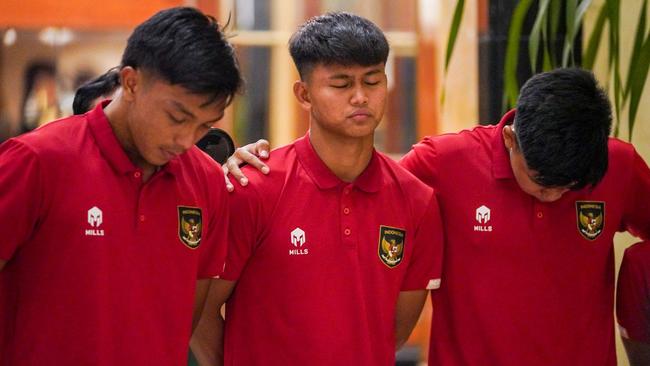Indonesian’s own goal a gift to hardline presidency rivals
The electability of presidential frontrunner Ganjar Pranowo has been tarnished by his refusal to host the Israeli soccer team.

Indonesia’s World Cup blunder has not only dented its international reputation but tarnished the electability of the country’s moderate presidential frontrunner, Central Java Governor Ganjar Pranowo, whose refusal to host the Israeli football team has handed a political advantage to more hardline rivals.
As the ruling Indonesian Democratic Party of Struggle (PDIP) tallies the cost of its disastrous political miscalculation, analysts have warned the issue could be a “sliding doors” moment that sways vote banks in next February’s presidential elections.
Mr Ganjar, the white-haired son of a policeman and the PDIP’s presumptive presidential nominee, was considered the man to beat in a three-cornered contest with his most likely rivals; former Jakarta governor Anies Baswedan and Defence Minister Prabowo Subianto.
But anger over his role in FIFA’s decision late last month to strip Indonesia of its right to host the Under-20 Football World Cup in May and June has cast a shadow over both the PDIP and Mr Ganjar, with a new survey by one of the country’s most respected pollsters suggesting both acted out of step with supporters.
The Indikator poll conducted days before Indonesia lost the FIFA event found a majority of respondents did not object to Israel’s participation.
Indikator executive director Burhanuddin Muhtadi told The Weekend Australian support for Israel’s participation was as high as 59 per cent before FIFA’s decision, and likely higher now because people were “angry with the events that led to the cancellation”.
“I suspect the one who will most benefit from this blunder will be Prabowo and (his) Gerindra party,” Dr Muhtadi said, given most PDIP voters supported Israel’s participation.
“Those who are disappointed with PDIP and Ganjar over the World Cup, demographically, are liberal and non-Muslim voters. If they are disappointed with PDIP and Ganjar, they will choose a (different) party or presidential candidate most similar to their demographic characteristics, and that is Gerindra and Prabowo.”
To win the presidency in Muslim majority Indonesia, a candidate must capture between 20 and 30 per cent of the minority vote.
Lieutenant General Prabowo, a former Kopassus special forces commander long dogged by human rights abuse accusations, is a two-time presidential challenger who relied on hardline Islamist support in the 2014 and 2019 polls – both of which he lost to President Joko Widodo. But his 2019 appointment as Defence Minister by Jokowi has helped rehabilitate his image.
Anies Baswedan also benefited from Islamist support in the controversial 2017 Jakarta gubernatorial election and politically motivated blasphemy accusations against Christian former governor Ahok, though has since tried to refashion himself as an even-handed technocrat. Pundits say he too will likely benefit from having stayed out of the FIFA debacle.
Both Mr Ganjar and Bali Governor Wayan Koster insist they acted in line with Indonesia’s long-held support for an independent Palestinian state, and were obeying instructions from their PDIP leadership by refusing to allow Israel to play in their provinces. The PDIP is chaired by Megawati Sukarnoputri, the daughter of Indonesia’s founding father, Sukarno, who pulled Indonesia out of a 1958 World Cup qualifier against Israel, and four years later refused to issue visas for the Israeli team to compete in the Asian Games.
Indonesia still has no formal diplomatic relations with Israel.
The World Cup loss was a stinging humiliation for the Jokowi government, just months after its deft handling of November’s G20 leaders’ summit.
In a television interview this week, Mr Ganjar apologised to millions of football fans and Indonesia’s youth team, whose place in the tournament is now at risk, conceding the PDIP may have lost political support and he the backing of Jokowi.
Indonesia’s FIFA humiliation has blown open festering tensions between Ms Megawati and Jokowi, whose considerable voter clout makes him a rival political kingmaker.
Asked if he was expected to fall into line behind Ms Megawati on the World Cup in order to secure her party’s presidential nomination, however, Mr Ganjar demurred. “We all know this is Megawati’s prerogative. I am an obedient member of the party,” he said.
Greg Fealy, an ANU emeritus professor in Indonesian politics and history, said Mr Ganjar’s answers were unlikely to satisfy many Indonesians, and while it was “Megawati and the PDIP that put him in this position, he has come up short”. “This will raise questions about his competence and his independence,” Professor Fealy said. “The question is, how long will this remain an issue? I am sure Ganjar will want this to go away but the problem is this World Cup is going to be held somewhere and Indonesians will constantly be reminded of it.”



To join the conversation, please log in. Don't have an account? Register
Join the conversation, you are commenting as Logout